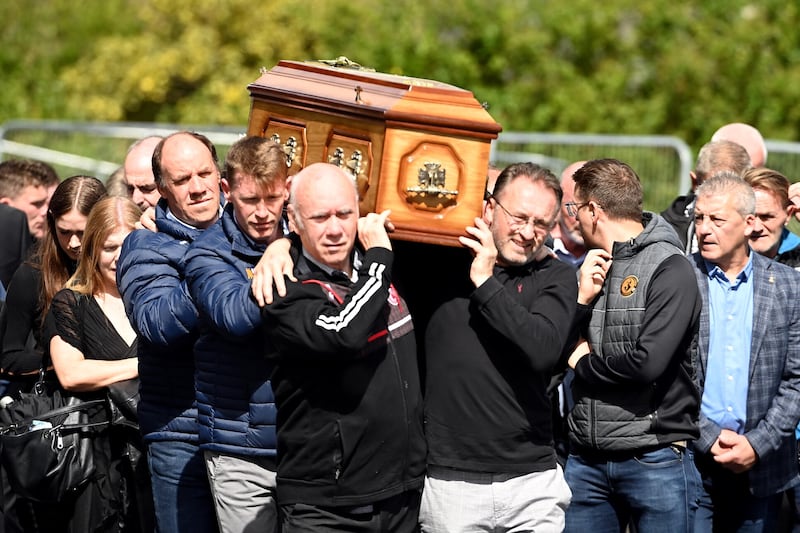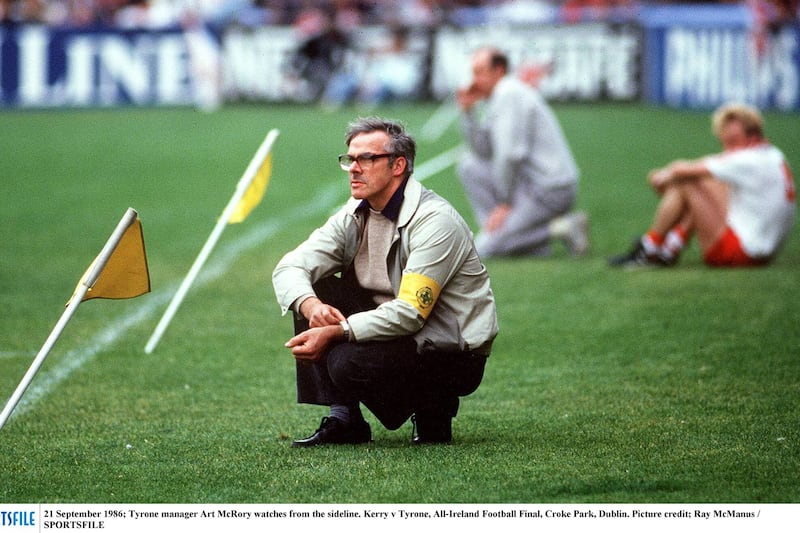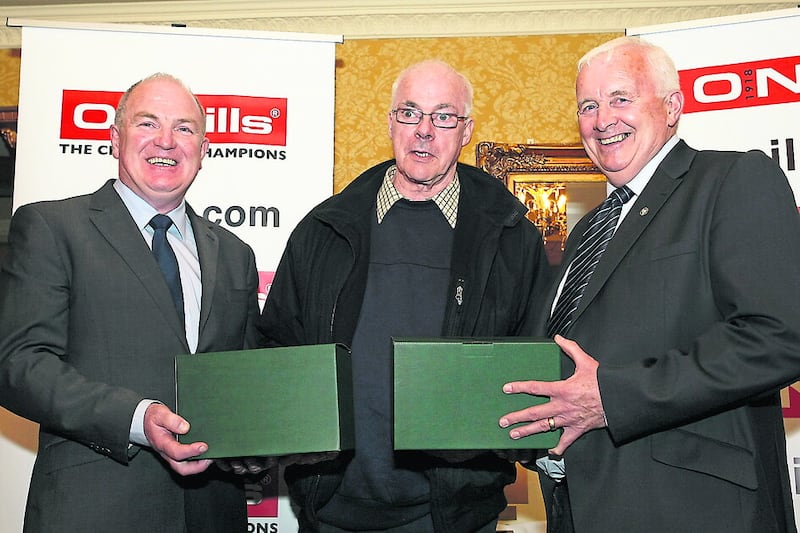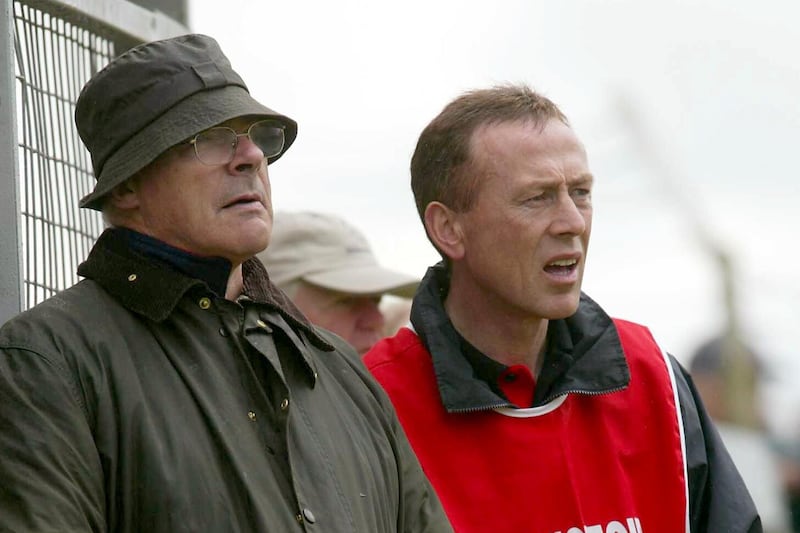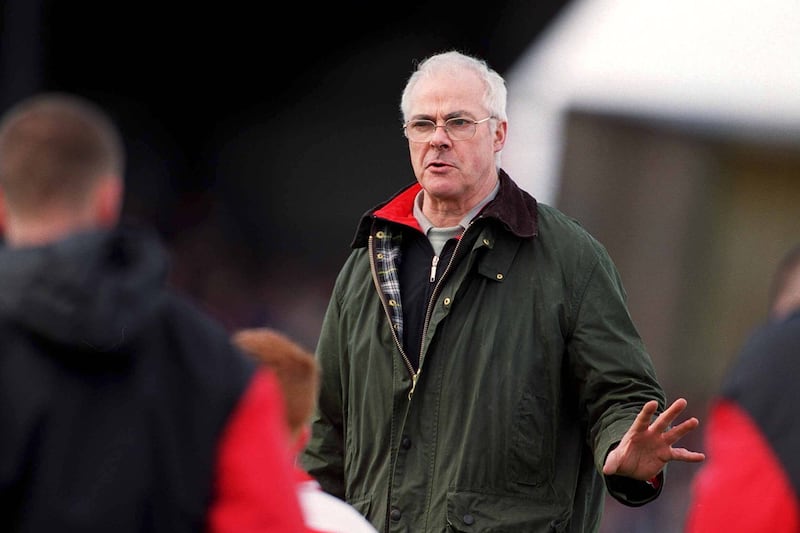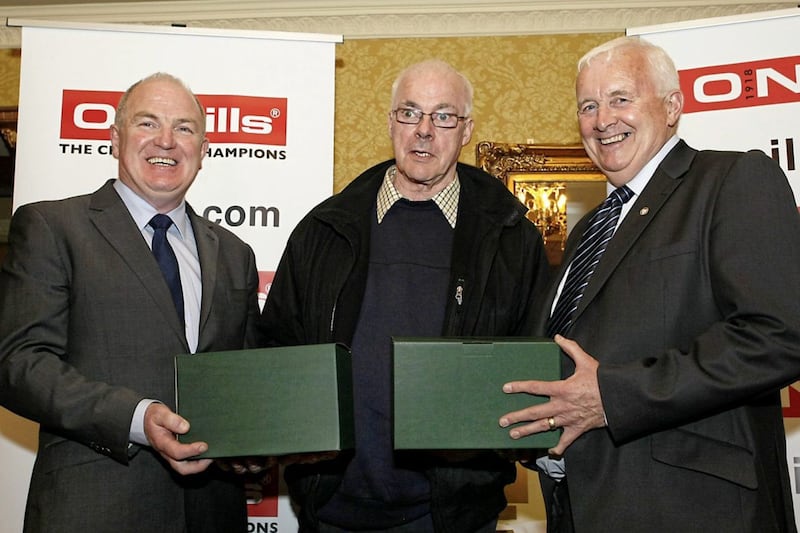SPECIAL treatment for everyone; adapted platform boots; those famous glasses covered in snow.
Talking about players in the wee front room; running from Dungannon to Coalisland – and back; persuading players to come home from America.
Eugene McKenna knew many facets of Art McRory, as a player, then as joint-manager, and finally as a friend.
Tyrone captain for most of Art’s first spell as manager from 1980 to 1987, the Augher player became co-manager with McRory for four seasons in the mid-Nineties, and again for the three campaigns of 2000 to 2002.
It was McRory who brought the future Allstar home: “I went to America in ’78, in San Francisco, living the dream. Art convinced me to come back [in 1980], because he felt he had something going.
“They were playing Antrim and I said, ‘Right, win the first round and I’ll come home’…”
The Red Hands edged that by a point in Casement Park, paving the way for a revival of football fortunes in the O’Neill county under McRory, recalls Eugene: “I came back but was planning to go back out, in all honesty, but we got to the Ulster Final that year and things moved on.”
Read more:
- The footballing life and times of Art McRory
- Peter Canavan pays touching tribute to his hero Art McRory
- Art McRory: a giant of Tyrone GAA, a man of wit and wisdom
The effort put in to improve was immense: “There was serious input from everybody to try to close the gap that had opened up to Dublin and Kerry. The gap to the pack was far wider than it is today.
“It took a fair slog from a number of teams to try to bridge the physical imbalance that was there.”
Art McRory drove those physical demands, Eugene recalls: “Very much so. Long, hard sessions. Players would do more sessions now but not as long.
“I remember running from the school in Dungannon to Coalisland – as a warm-up. Then doing 400m sprints around the Gortgonis [playing fields], and then running back home [to Dungannon] again. It certainly didn’t lack for intensity; maybe the science…”
Having said that, there was incipient match analysis too, especially when McKenna entered into management in Art’s second spell in charge of Tyrone, starting in 1992.
“John Mulgrew, who died a lock of years ago, would have been a big supporter of Tyrone; he did the videos of matches. Win, lose, or draw it was out to Mulgrew’s to have a review of the match.
“Obviously you didn’t have the statistical back-up that you have now, but Art was always pushing for an edge.
“In the 80s, he arrived in one night, he arrived in with these boots, like platform boots with no heels on them. He was big into basketball and their trainers used them to develop lower calf muscles. You walked about on the balls of your feet, gradually built up and walked a bit faster. I don’t know where they went; I’m sorry I never kept a pair. That was one of Art’s schemes of betterment.
“He brought Bob Granville in. We were down seeing him in Belfast a few months ago. Bob would have been a very hands-on physio, who Art met through the greyhounds. Art was always pushing boundaries.”

No one was pushed harder than Art McRory himself, though, insists McKenna: “I remember, around 2000, out training in Donaghmore because they had floodlights. It was snowing, Art taking the training, and the glasses getting covered in snow, a gale-force wind. I was thinking, ‘What is driving that man?’ He was 60 at that stage.
Although his image, especially to outsiders, was brusque and gruff, Art McRory cared about players. It took McKenna some time to notice one trick of the Dungannon man’s ‘management science’:
“His special thing, while being consistent to everyone in the group, honest and straightforward, was that individual players at times got something extra to help them perform – to the extent that everybody in the group felt at some stage that they were getting ‘special treatment’. It was a skill I hadn’t seen before, certainly in a sporting situation.
“Equity and equality became a concept in management-speak. Art was practising that within the group before it became popular.
“He took me to county Down, I’d groin issues, to see the Down doctor. You never forget that. He had all the contacts.”
McRory also involved ‘player input’, although cleverly McKenna’s recollection involves what many might regard as a ‘no-brainer’.
“He was going to make an approach to Frank McGuigan, who was in America. I remember Art asking me, as captain, ‘What do you think about Frank coming home?’
‘Aye, I’d be all for it.’
‘I’d better put it to the players,’ said Art.
Of course, there was unanimous agreement, and the Ardboe genius famously scored 11 points against Armagh in the 1984 Ulster Final triumph.
Tyrone were well beaten by reigning champions Dublin in the subsequent All-Ireland semi-final, but when they regained Ulster two years later they saw off Galway – inspired by McKenna - to reach the All-Ireland Senior Football Final for the first time in the county’s history.
Kerry proved too much for them and, as McKenna put it, Art “pulled the plug in ‘87. Having “played a bit part in ‘91”, Eugene retired from inter-county involvement – or so he thought.
Art McRory came calling when he returned as boss, succeeding John Donnelly after the 1992 campaign, and McKenna couldn’t turn him down: “I felt I owed it to him, in a sense; he’d put in so much for me. I felt it was the least I could do, give something back.”
He laughs when asked about his role: “First year, Dessie Ryan was there too, it was quite easy: I just listened and watched. Dessie was finding it tough going, so after that it was just Art and myself. We spent a lot of time talking through players, would have travelled everywhere together.
“It was important that a player didn’t get a different message from me than Art; they’d have got different words. You know human nature – if you don’t get the answer you want you’ll go to someone else, ‘Can I get a different answer?’”
McKenna took on one of the tougher tasks, he reveals: “It would have evolved, Art had done enough time in the hard decisions, letting players know when they weren’t on; I’d have taken on a bit more of that and felt I deserved to, because he’d put in a serious shift for me.”
Another laugh, though, as he confirms: “Art could be ‘bad cop’ any time.”

The less said about the controversial losses in the 1995 All-Ireland Final and 1996 semi-final, to Dublin and Meath, the better.
That was that, as far as McKenna was concerned: “We’d done four Championships – if you haven’t won it, there’ll be voices of malcontent. Meath was gutting, well, both were gutting.”
Still, the hunger was still there, and McRory returned for a third stint as Tyrone manager. “When he came back in 2000, I was quite surprised that he wanted to go again. ‘Well, if he wants to do it, why can’t I give it another rattle?’
“Helen [Art’s late wife] was a big supporter of what he was doing, and that allowed him to put the effort in.”
Helen’s death earlier this year was hard, of course. We’d almost lost Art around a year before, in March 2022, when McKenna recalls “he was very to survive a serious heart attack, same as this one, he was in that wee front room. The office on the left hand through the front door. The inner sanctum.
“He had everything in there in terms of dogs, football… Him and me would have spent long nights there debating players and so forth.”
Art’s straightforwardness obviously passed onto the next generation: “Back then he phoned Colm, who says ‘What are you phoning me for? Phone the ambulance first?’ He survived that, got a few stents put in, and bounced back.”
Read more:
- 'Art McRory wanted us to find out were they actually a superior race to us'
Right to the end, Art McRory was keeping busy, involved with family – sons Colm and Ciaran, daughter Eva, and the grandchildren - and, of course, the GAA. “It was like old times,” says Eugene, “you had to ring Art before nine o’clock at night because he went to bed early and got up early.
“He’d have been down at the swimming pool at half seven with one of Colm’s children.
“The typical things he was doing his week: his sons Colm and Ciaran live locally, out in the country, Art has a couple of greyhounds that Colm helps look after. He was helping with the Clarke’s match against Loughmacrory.
“He’d have been getting good mileage out of Ciaran’s girls playing football for Killeeshil, and Colm’s lad playing a bit of golf. You know his nature, Art was just generous to a fault.”
Indeed McKenna sums up well how much Art McCrory gave of himself, to Tyrone and Ulster GAA:
“Schools football, Tyrone – various county teams, Ulster Schools, and he’d have been a champion of the Railway Cup, kept it going along with Brian McEniff.”
“No man would have done even a fraction, not even just for Tyrone, because he was involved with a lot of underage teams in Tyrone, and junior, senior. His zone of influence was huge, the amount of work he put into it. No one will ever touch it.”



